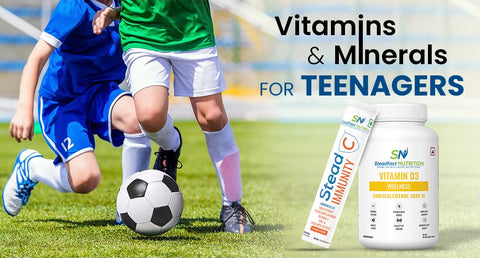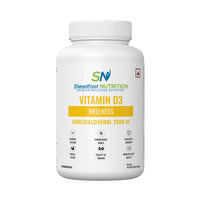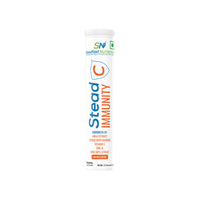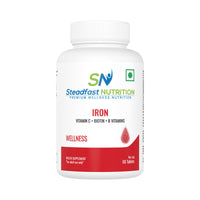During the teenage years, the body undergoes significant transformations like growth spurts and hormonal changes. This increases the requirement to include all essential nutrients for healthy growth and development, crucial for supporting the body during this time of rapid growth. However, though teenagers have higher nutritional requirements, they often have poor diets because of overindulgence on junk over healthy food. This leads to nutritional deficiencies. Including these vitamins in the diet can help fill these gaps, ensuring proper growth and development. Supplements can be taken for overcoming deficiencies but only under the advice of a doctor.
Vitamins
1. Vitamin D
Vitamin D is important for teenagers because it helps the body absorb calcium and phosphate, essential for strengthening bones, teeth, and muscles. Our body makes Vitamin D when exposed to sunlight, and it's also found in foods like egg yolks, fish oils, and fortified milk. Many teens don't get enough Vitamin D, leading to issues like fatigue, bone pain, muscle weakness, and growth retardation. Deficiency can cause rickets, a bone deformity. To prevent this, teens should get Vitamin D from sunlight, certain foods, and possibly, supplements, especially in autumn and winter. Children need at least 400 IU of Vitamin D daily, from sunlight and often from food sources, fortified formula or supplements.
Vitamin D capsules from Steadfast Nutrition provide 2000 IU cholecalciferol, which can help address the deficiency. However, it’s best to take a doctor’s advice before starting a supplement. Given that only a few dietary sources contain vitamin D3, taking Vitamin D3 supplements can prevent deficiency.
2. Vitamin A
Vitamin A is essential for teenagers as it supports vision, immune function, skin health, and the growth and development of cells. It promotes healthy eyes, skin, bones, and soft tissue, and aids in producing mucus. This vitamin is crucial for night and colour vision, tissue repair, and overall growth. Key sources of Vitamin A include dairy products, leafy green vegetables, carrots, sweet potato, pumpkin, broccoli, liver, bell peppers, oily fish, and eggs. Fruits high in vitamin A include papaya, mango, grapes, berries, apricot and tomato.
3. Vitamin B6
Vitamin B6 is essential for teenagers as it supports brain development, helps convert food into energy, and aids in the production of neurotransmitters that regulate mood. It also contributes to red blood cell production and healthy skin. Key food sources include green leafy vegetables, avocado, banana, papaya, orange, cantaloupe, tofu, potatoes, nuts, wholegrain foods, fortified cereals, meat, fish, poultry, and chickpeas. Adequate intake of Vitamin B6 helps maintain energy levels, cognitive development, and overall health.
4. Vitamin B12
Vitamin B12 is essential for red blood cell production and nerve cell function, promoting growth and supporting metabolism, brain development, and a healthy heart and nervous system. Vitamin B12 may also improve focus and memory. Key food sources include fish, red meat, milk, cheese, eggs, spinach, beetroot, mushroom and fortified cereals. Daily recommended intake varies by age, with teens needing 2.2 micrograms. Those on a vegan diet may need supplements, as B12 is primarily found in animal products.
5. Vitamin C
Vitamin C is crucial for synthesising collagen, which is important for forming healthy bones, teeth, gums, and blood vessels. It boosts the immune system, aids in iron and calcium absorption, and helps heal wounds. Key food sources include citrus fruits, berries, kiwi, guava, peppers, broccoli, tomatoes, Brussels sprouts, cabbage, and cauliflower. Cooking can reduce Vitamin C content in foods. Known for its role in preventing illnesses because of its antioxidant and anti-inflammatory properties and promoting overall health, Vitamin C is often considered essential for both teens and adults.
Vitamin C tablets are easily available in the market and can help fulfil the amount of Vitamin C required in the body. Steadfast Nutrition's SteadC is one such formulation which is a great and simple way to boost your vitamin C intake if you struggle to get enough from your diet. The effervescent formulation is easy to consume and has a refreshing flavour. It provides 40 mg of vitamin C, which meets more than half of the recommended dietary allowance for teenagers.
6. Biotin
Biotin (Vitamin B7) is essential for teenagers for nervous system function, energy production, and maintaining healthy skin, hair, and nails. It helps break down food into energy. Key sources are eggs, nuts, legumes, whole grains, dairy products, sweet potatoes & mushrooms. Deficiency is uncommon but can lead to hair loss, skin rashes, and brittle nails.
MINERALS
1. Iron
Iron is vital for teenagers as it helps produce haemoglobin, boosts energy levels, supports brain development, and strengthens the immune system. Due to the expansion of blood volume and increase in muscle mass, teenagers require iron to meet their growing needs. Key sources include red meat, poultry, fish, watermelon, avocado, nuts & seeds, broccoli, beans and leafy greens. Iron deficiency can cause fatigue, weakness, anxiety, dizziness, and poor attention & cognitive function. Hence, ensuring adequate intake of iron is important for overall health.
Steadfast Nutrition’s Iron tablet is an excellent solution for reversing iron deficiency and its symptoms. It includes iron in the form of ferrous fumarate, along with Vitamins B1, B2, B3, B5, B6, B7, B9, B12, and Vitamin C. These ingredients work synergistically to prevent iron deficiency anaemia, increase haemoglobin levels, reduce fatigue, and boost immunity. Steadfast Nutrition’s Iron tablet can be taken by iron-deficient teenage girls since it provides 29 mg of iron, which meets 90% of their recommended dietary allowance.
2. Calcium
Calcium is key for teenagers to build strong bones and teeth, support muscle function, and maintain nerve health. Teenagers require calcium for the mineralisation of bones during this growth period and to support stronger bones. Essential sources include dairy products, fish, leafy greens, seeds and ragi. Ensuring adequate calcium helps prevent the brittling of bones and supports overall bone health.
3. Zinc
Zinc is essential for teenagers, aiding in growth, immune function, muscle tissue growth & repair, wound healing, and cell division. Important sources include meat, seafood, dairy, nuts, seeds, whole grains, and legumes. Proper zinc intake supports overall health and development during the teenage years.
4. Iodine
Iodine supports thyroid function, metabolism, and brain development in teenagers. Iodine deficiency can cause irreversible damage to the brain, impairing cognitive functions. It can also aggravate to thyroid disorders. Essential sources include seafood, dairy, eggs, pineapple, cranberries, strawberries, iodised salt, and fortified bread. Adequate iodine helps ensure proper growth and cognitive health.
Conclusion
Hence, vitamins and minerals are crucial during this growth phase for the healthy development of teens and children. Ideally, they should obtain their nutrients from a balanced diet and healthy lifestyle. While supplements may be beneficial for those struggling to meet the daily requirements, they are often unnecessary for those who take a varied and nutritious diet. Always consult a doctor before starting supplements, as an excessive intake can be harmful. For dietary concerns or restrictions, seek personalised advice from a doctor or dietitian.




